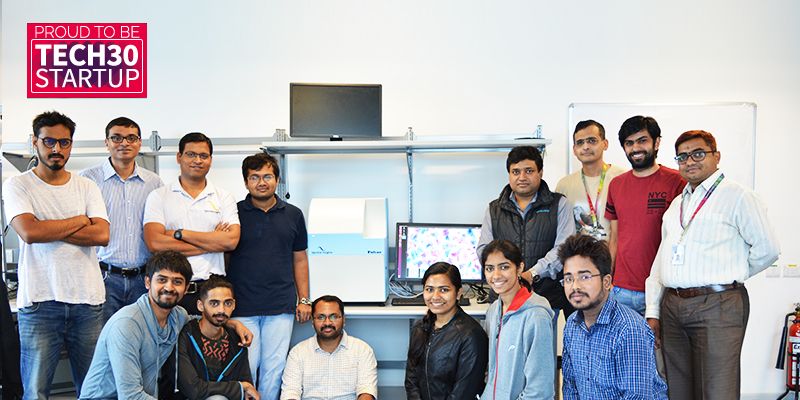Spectral Insights offers IoT solutions to aid medical diagnosis
The startup provides a fully vertical integrated solution for pathology labs and hospitals along with tools to boost a pathologist’s efficiency in enabling a diagnosis.
As lifestyles become complex, so have diseases and their diagnosis. Stories of family doctors diagnosing ailments with just a touch are the stuff legends are made of, but not anymore.
As Internet of Things (IoT) becomes the new buzzword, different sectors in India are looking to explore new innovations in this field in a big way, and medicine is not far behind. The healthcare sector is seeing increased use of Artificial Intelligence (AI) and Machine Learning to improve productivity and efficiency.
Spectral Insights, a Tech30 company, has forayed into this space with a fully vertical integrated solution for pathology laboratories and hospitals. It converts manual microscopy operations into digital images and provides tools to significantly boost a pathologist’s efficiency thus improving diagnosis.

The idea behind the company
“The number of highly-skilled pathologists for the 130,000 plus labs in India are way lower than the demand. Moreover, the process in most labs is still manual, and therefore laborious. Downtime and human fatigue is high. Diseases are becoming more complex but education is not catching up. There is no need to depend on archaic methods anymore. The only way to solve these problems is to go digital,” Prasanth Perugupalli, Managing Director and CEO of Spectral Insights, and also one of its co-founders, on what prompted the launch of Spectral Insights.
Spectral Insights’ core portfolio comprises a proprietary spectral camera and an image analytics studio. Its fully-automated digital microscope has been built for lab conditions in India and the developing world. The software modules deal with most of the microscopy workload in a pathology lab or hospital.
The company was co-founded 16 months ago by Prasanth, Dipankar Das, Sumit Nath, Raghubansh Gupta, and Suhash Gerald in Bengaluru. The co-founders worked for IMEC India, a R&D and innovation hub in nanoelectronics and digital technologies before they decided to turn entrepreneurs. The team is a mix of technologists, and product management and business professionals who came together with to a world-class product and ecosystem.
The importance of going digital
According to Prasanth, less than one percent of pathology labs in India are digitised, as most cannot afford the equipment. “You need a company to build a system that works in humidity control environments, suit Indian lab conditions and mentalities of lab technicians, build a product that puts operating procedure and protocol at the centre and implements them while also building hardware capability to work in Indian conditions,” he says.
The company’s product suite has an automated digital microscope that provides pathologists with digital images, either locally or over the cloud. There are also other tools that count cells, tumour boundaries to detect cancer, etc, that can be deployed to help make quick and accurate diagnoses. This helps save time, eases work pressure and increases efficiency.
Though Spectral Insights is not a niche company, it is the only one in India from the perspective of a full product suite, according to its founders. Currently, it is conducting pilots in pathology labs and hospitals and hopes to convert them into a consumer base soon.
“We are now piloting our first generation Digital Pathology platform (called Vulcan) and various software modules running on it for Histopathology, Hematology, and Cytology imaging and analytical outcomes for aiding the pathologists for rapid, evidence-based reporting anywhere, anytime,” informs Prasanth.
Business model and funding
Spectral Insights is working on two plans to enter the market. “We propose to sell our system to end-customers who will pay us for software upgrades and algorithms with the data on our systems. The second model is a first-of-its-kind in India and works on the principle where customers can essentially pay us a monthly rental for our systems, using them on the basis of the software we provide,” Prasanth says.
The company raised an undisclosed amount in a seed round in October last year, and is now preparing to raise the next round of funding to scale up operations.
Challenges during the process
“Some components are tough to procure in India and have to be imported from Japan. Other challenges include finding the right vendors and partners who would understand out work culture. Also, getting the software and hardware in place was challenging,” says Dipankar.
“Medical tech is a very tricky space to be in. The quality has to be the best in the world, while the cost has to be affordable. We want to first establish in India, and use this ecosystem as a means to mature, derive differentiation and go further. There is a clear path to venture into South East Asia, Africa, and even Europe through partners. Our goal is that by the end of next year, we should have deployed a few systems in India,” says Prasanth.
“We will continue to go after challenges and build systems. Our next venture will hopefully be in the agritech sector,” he adds.










![[Funding alert] Venture Catalysts leads a 2Cr investment in trading platform AlgoBulls](https://images.yourstory.com/cs/2/e641e900925711e9926177f451727da9/Imageszlz-1606283773383.jpg)
